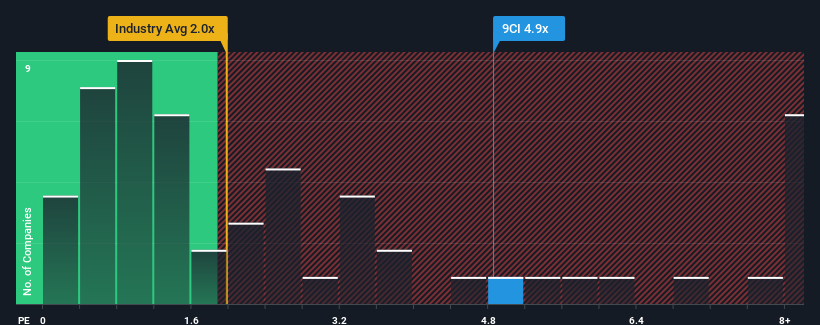- Singapore
- /
- Real Estate
- /
- SGX:9CI
Market Participants Recognise CapitaLand Investment Limited's (SGX:9CI) Revenues

CapitaLand Investment Limited's (SGX:9CI) price-to-sales (or "P/S") ratio of 4.9x may look like a poor investment opportunity when you consider close to half the companies in the Real Estate industry in Singapore have P/S ratios below 2x. Nonetheless, we'd need to dig a little deeper to determine if there is a rational basis for the highly elevated P/S.
View our latest analysis for CapitaLand Investment

What Does CapitaLand Investment's P/S Mean For Shareholders?
CapitaLand Investment hasn't been tracking well recently as its declining revenue compares poorly to other companies, which have seen some growth in their revenues on average. Perhaps the market is expecting the poor revenue to reverse, justifying it's current high P/S.. You'd really hope so, otherwise you're paying a pretty hefty price for no particular reason.
Keen to find out how analysts think CapitaLand Investment's future stacks up against the industry? In that case, our free report is a great place to start.Is There Enough Revenue Growth Forecasted For CapitaLand Investment?
There's an inherent assumption that a company should far outperform the industry for P/S ratios like CapitaLand Investment's to be considered reasonable.
Retrospectively, the last year delivered a frustrating 3.2% decrease to the company's top line. Still, the latest three year period has seen an excellent 40% overall rise in revenue, in spite of its unsatisfying short-term performance. Accordingly, while they would have preferred to keep the run going, shareholders would definitely welcome the medium-term rates of revenue growth.
Looking ahead now, revenue is anticipated to climb by 6.6% per year during the coming three years according to the twelve analysts following the company. With the industry only predicted to deliver 2.7% per annum, the company is positioned for a stronger revenue result.
With this in mind, it's not hard to understand why CapitaLand Investment's P/S is high relative to its industry peers. Apparently shareholders aren't keen to offload something that is potentially eyeing a more prosperous future.
What We Can Learn From CapitaLand Investment's P/S?
While the price-to-sales ratio shouldn't be the defining factor in whether you buy a stock or not, it's quite a capable barometer of revenue expectations.
Our look into CapitaLand Investment shows that its P/S ratio remains high on the merit of its strong future revenues. At this stage investors feel the potential for a deterioration in revenues is quite remote, justifying the elevated P/S ratio. Unless the analysts have really missed the mark, these strong revenue forecasts should keep the share price buoyant.
There are also other vital risk factors to consider and we've discovered 4 warning signs for CapitaLand Investment (2 are concerning!) that you should be aware of before investing here.
If these risks are making you reconsider your opinion on CapitaLand Investment, explore our interactive list of high quality stocks to get an idea of what else is out there.
New: AI Stock Screener & Alerts
Our new AI Stock Screener scans the market every day to uncover opportunities.
• Dividend Powerhouses (3%+ Yield)
• Undervalued Small Caps with Insider Buying
• High growth Tech and AI Companies
Or build your own from over 50 metrics.
Have feedback on this article? Concerned about the content? Get in touch with us directly. Alternatively, email editorial-team (at) simplywallst.com.
This article by Simply Wall St is general in nature. We provide commentary based on historical data and analyst forecasts only using an unbiased methodology and our articles are not intended to be financial advice. It does not constitute a recommendation to buy or sell any stock, and does not take account of your objectives, or your financial situation. We aim to bring you long-term focused analysis driven by fundamental data. Note that our analysis may not factor in the latest price-sensitive company announcements or qualitative material. Simply Wall St has no position in any stocks mentioned.
About SGX:9CI
CapitaLand Investment
Headquartered and listed in Singapore, CapitaLand Investment Limited (CLI) is a leading global real asset manager with a strong Asia foothold.
Proven track record with mediocre balance sheet.
Market Insights
Community Narratives



